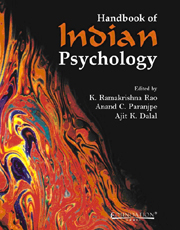Book contents
- Frontmatter
- Contents
- Contributing Authors
- Preface
- 01 Prologue: Introducing Indian Psychology
- 02 Indian Thought and Tradition: A Psychohistorical Perspective
- PART I SYSTEMS AND SCHOOLS
- 03 Jaina Psychology
- 04 The Foundations of Early Buddhist Psychology
- 05 Varieties of Cognition in Early Buddhism
- 06 A Buddhist Theory of Unconscious Mind (Ālaya-Vijñāna)
- 07 Indian Buddhist Theories of Persons
- 08 Buddhist Psychology: A Western Interpretation
- 09 Transpersonal Psychology in the Bhagavad-Gītā: Reflections on Consciousness, Meditation, Work and Love
- 10 Yoga Psychology: Theory and Application
- 11 Patañjali Yoga and Siddhis: Their Relevance to Parapsychological Theory and Research
- 12 Yoga Psychology and the, Sāṃkhyā Metaphysic
- 13 Psychology in the Advaita Vedānta
- 14 The Nyāya-Vaiśeṣika Theory of Perceiving the World of our Experience
- 15 Psychological Theories and Practices in Āyurveda
- PART II TOPICS AND THEMES
- PART III APPLICATIONS AND IMPLICATIONS
- Pronunciation and Transliteration of Sanskrit Alphabet
- Glossary
- Index
06 - A Buddhist Theory of Unconscious Mind (Ālaya-Vijñāna)
from PART I - SYSTEMS AND SCHOOLS
Published online by Cambridge University Press: 26 October 2011
- Frontmatter
- Contents
- Contributing Authors
- Preface
- 01 Prologue: Introducing Indian Psychology
- 02 Indian Thought and Tradition: A Psychohistorical Perspective
- PART I SYSTEMS AND SCHOOLS
- 03 Jaina Psychology
- 04 The Foundations of Early Buddhist Psychology
- 05 Varieties of Cognition in Early Buddhism
- 06 A Buddhist Theory of Unconscious Mind (Ālaya-Vijñāna)
- 07 Indian Buddhist Theories of Persons
- 08 Buddhist Psychology: A Western Interpretation
- 09 Transpersonal Psychology in the Bhagavad-Gītā: Reflections on Consciousness, Meditation, Work and Love
- 10 Yoga Psychology: Theory and Application
- 11 Patañjali Yoga and Siddhis: Their Relevance to Parapsychological Theory and Research
- 12 Yoga Psychology and the, Sāṃkhyā Metaphysic
- 13 Psychology in the Advaita Vedānta
- 14 The Nyāya-Vaiśeṣika Theory of Perceiving the World of our Experience
- 15 Psychological Theories and Practices in Āyurveda
- PART II TOPICS AND THEMES
- PART III APPLICATIONS AND IMPLICATIONS
- Pronunciation and Transliteration of Sanskrit Alphabet
- Glossary
- Index
Summary
Freud shocked the Western world just over a hundred years ago with his audacious assertion that our actions, thoughts and feelings are largely determined by processes occurring outside our conscious awareness. We have accommodated ourselves to this “dethroning” of the rational ego, but the sting still remains: our experience is inescapably shaped by cognitive structures and processes we neither clearly control nor even fully discern. We are not, it seems certain, truly in charge. Although this same basic message is currently couched in the unquestioned voice of science, rather than the questioned voice of psychoanalysis, this irrevocable loss of our autonomous self, like the sudden death of a close friend, haunts us still.
This was not what happened in India some fifteen centuries ago when Buddhist and Hindu yogis and philosophers systematically examined and analysed how unconscious processes determine the shape of our experiences and delimit the autonomy of our actions. But since these observations arose out of traditions that had long before deconstructed any autonomous ego, the idea of unconscious mental processes upheld, rather than undermined, their overall moral vision. Paradoxically, the loss of an autonomous self proved a gain in understanding of self.
This essay aims to explain how this came about within Buddhist traditions, how and why an explicit notion of unconscious mental processes, called ālaya-vijñāna, developed within classical Indian Yogācāra Buddhism. We shall note in passing parallels found in modern psychology or cognitive science.
Briefly, we will trace the development of this distinctively Buddhist concept of unconscious mind back to the early texts of the Pāli Canon.
- Type
- Chapter
- Information
- Handbook of Indian Psychology , pp. 105 - 128Publisher: Foundation BooksPrint publication year: 2008
- 5
- Cited by



